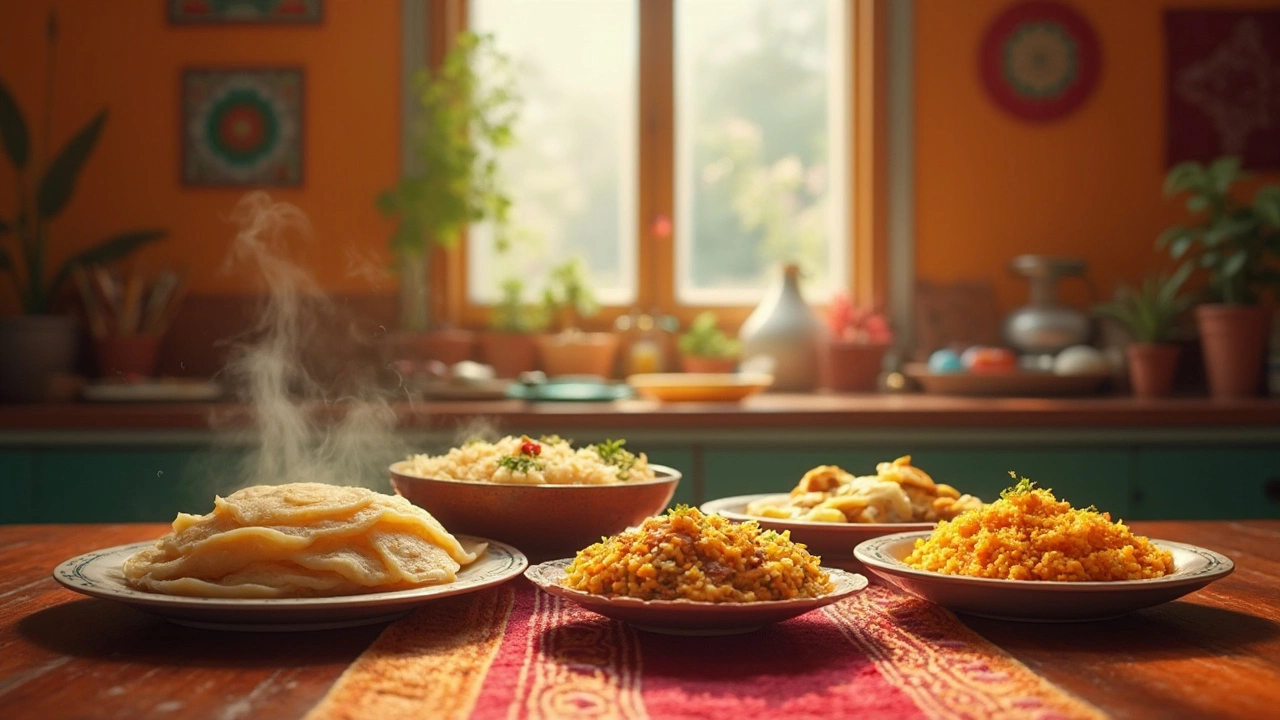Indian Breakfast: Traditional Flavors to Start Your Day
When thinking about Indian breakfast, the first meal of the day in India that blends regional spices, grains, and legumes into hearty dishes. Also known as breakfast in India, it sets the tone for daily energy and mood. A well‑balanced Indian breakfast often includes protein‑rich lentils, carbohydrate‑filled flatbreads, and fermented batter dishes, creating a satisfying mix of texture and taste.
One of the most iconic items is dosa, a thin, crispy crepe made from fermented rice and urad dal batter, popular in South India. Dosa showcases how fermentation improves digestibility and adds a tangy flavor, making it a perfect companion to spicy chutneys and sambar. Another staple, roti, a whole‑wheat flatbread cooked on a hot tawa, common across North India, offers a neutral base for vegetable curries or dal. Both dosa and roti illustrate the principle that Indian breakfast includes a grain‑based carrier paired with nutrient‑dense toppings. When you pair them with dal, a simmered split‑pulse dish seasoned with turmeric, cumin, and mustard seeds, you get a protein‑packed meal that fuels you for hours.
Vegetarian Indian meals, especially in the morning, rely heavily on dal because it delivers plant‑based protein without the heaviness of meat. Dal comes in many varieties—masoor, moong, toor—each with its own cooking time and water‑ratio, which we break down in our guides. The combination of dal with roti or dosa creates a balanced vegetarian Indian breakfast that covers carbs, protein, and fiber. Beyond nutrition, these dishes carry cultural stories: a hot roti signifies hospitality in Punjabi homes, while a crisp dosa is linked to temple offerings in Karnataka.
Health, Convenience, and Regional Twists
Modern Indian kitchens often seek shortcuts without sacrificing flavor. Adding a pinch of baking soda to dosa batter, for example, speeds up fermentation and yields extra crispiness – a tip explored in our articles. Similarly, tweaking roti dough with oil or yogurt can prevent it from staying flat, ensuring that perfect puff we all love. For busy mornings, pre‑soaking dal overnight reduces cooking time and improves digestibility, a practice backed by food science. These practical tweaks reflect the larger trend that Indian breakfast is both traditional and adaptable to contemporary lifestyles.
Below you’ll find a curated collection of articles that dives deeper into each of these topics—whether you want to master the perfect dosa, learn the exact water‑ratio for various dals, or discover why some regions favor sweet breakfast items over savory. The guides are designed to give you actionable steps, clear ratios, and troubleshooting tips so you can confidently whip up a wholesome Indian breakfast at home.

Why Hindus Avoid Pork: Understanding Cultural Dietary Choices
In India, dietary customs vary significantly across different religions and communities. Among Hindus, pork consumption is generally avoided, influenced by cultural, religious, and historical factors. This article delves into reasons behind this dietary preference, shedding light on religious beliefs and health considerations. It also explores how these choices impact popular Indian breakfast options. Understanding these dietary practices can enhance cultural appreciation and help cater to diverse dietary needs.
- Chutney Recipes (13)
- General (11)
- Healthy Living (10)
- Easy Indian Recipes (9)
- Chicken Curry Recipes (9)
- Healthy Indian Snacks (8)
- Paneer Recipes (7)
- Dal Recipes (7)
- Street Food (7)
- Dosa Recipes (7)
-
How to Fix Vinegary Homemade Chutney and Achieve Perfect Flavor
1 Feb 2025 -
Most Eaten Snack in India: Healthy Indian Snacks You Can't Ignore
7 Jun 2025 -
How Much Milk Is Required to Make Paneer?
23 May 2025 -
Most Selling Street Fast Food in India: Top Picks You Can't Miss
21 Jun 2025 -
Chicken Curry Recipe: What Makes a Delicious Curry?
1 Jun 2025
26.02.25
Kaia Binari
0